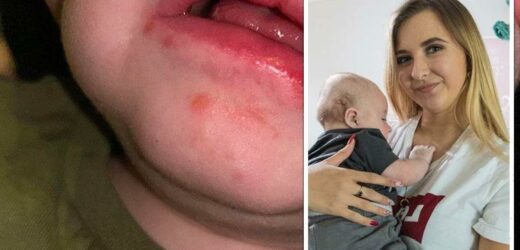Scarlet fever: Doctor details symptoms of bacterial infection
We use your sign-up to provide content in ways you’ve consented to and to improve our understanding of you. This may include adverts from us and 3rd parties based on our understanding. You can unsubscribe at any time. More info
Parents are on high alert as cases of scarlet fever have started to spike on the UK, with at least nine children dying due to emerging health complications. On very rare occasions, the bacteria called group A streptococci, referred to as Strep A, can get into the bloodstream and cause an illness called invasive Group A strep (iGAS). But with cases on the rise, the UK Health Security Agency (UKHSA) issued a rare alert on Friday evening. Now, parents and carers are being told to look out for key symptoms – and those which are not so obvious.
The UKHSA has noted that while still uncommon, there has been an increase in invasive Group A strep cases this year, particularly in children under 10. There were 2.3 cases per 100,000 children aged one to four compared to an average of 0.5 in the pre-pandemic seasons (2017 to 2019) and 1.1 cases per 100,000 children aged five to nine compared to the pre-pandemic average of 0.3 (2017 to 2019) at the same time of the year.
The main Strep A symptoms
Parents should look out for a high fever, severe muscle aches, pain in one area of the body, redness at the site of a wound or vomiting or diarrhoea as signs to suggest they may have Strep A.
One mum has issued a warning to other parents, urging them to look out for the signs after both of her children caught Strep A. Aimee Byron, 22, a stay-at-home mum, said son Jamie Jones, three, became tired and started screaming in pain, holding his head saying he had “tickles in his throat”. Speaking to Bristol Live she said that her son’s throat was covered in big white spots. However, the doctors told Ms Byron that her son was suffering from tonsillitis – an infection caused by the same bacteria.
With tonsillitis spots on the tonsils are a common sight, along with redness, swelling, a sore throat and difficulty swallowing. However, after a few days of suffering, Ms Byron took her son back to the GP where he was diagnosed with Strep A and was taken to the hospital for treatment. Jamie had a sore throat, large glands, was drowsy and holding his ears, couldn’t swallow drinks and wasn’t passing urine.


But just a day after Jamie returned home, his little brother Drew, 17 months, was diagnosed with the same bacterial infection. Both boys are now recovering at home, as Aimee and Will Jones, 24, a salesman, say they feel lucky they trusted her instincts and didn’t believe it was just tonsillitis.
Ms Byron said: “It made me feel so helpless because you feel like screaming at the doctor. I know they have done years and years in studying but I know my child. It was so refreshing to hear the doctor say they weren’t going to question me on my child.
“I am so unbelievably lucky to have my Jamie at home, getting better when this story could have had such a devastating end. He is luckily at the better end of the scale now in terms of Strep A severity but if left it could’ve been worse.”
On Tuesday November 29, Jamie woke up feeling drowsy and restless but Aimee had thought it was down to him having a late night the day before. Later that day he was screaming in pain holding his head.


His mum looked down his throat and saw that his tonsil were “nearly touching” and the back of his throat was covered in white big spots and small red pinpricks. After a restless night, Ms Byron called the doctors.
The family received a phone consultation and after sending over pictures the doctor diagnoses Jamie with tonsillitis and told Aimee to monitor how much he was drinking and seeing.
She said: “I had looked at photos online of Strep Throat and what Jamie had looked exactly the same. I questioned that and he didn’t really make a comment. We got antibiotics and started them straight away. Jamie went for a wee Wednesday afternoon and didn’t go again until Friday morning and when he went it was the tiniest amount.
“On Thursday evening, I thought ‘I’m not having this’ and I got told I can either have a phone appointment within hours or take him to the hospital.”
DON’T MISS:
Putin handed energy lifeline as Xi vows to ‘join hands with Russia’ [REVEAL]
Scientists urge Sunak to ditch UK’s ‘devastating’ energy source [INSIGHT]
Heat pump warning as EDF urges Brits to take simple first step [REPORT]

The UKHSA has advised parents to above-all, trust their own judgement. But they must consult NHS 111 or their GP in any of the following instances:
- Your child is feeding or eating much less than normal
- Your child has a dry nappy for 12 hours or more or shows other signs of dehydration
- Your baby is under three months and has a temperature of 38C or more
- If your baby is over three months and has a temperature of 39C or higher and they feel hot to touch on the back or chest
- And your child is very tired or irritable.
The health officials added that parents should call 999 or go to A&E if:
- Your child is having difficulty breathing – you may notice grunting noises or their tummy sucking under their ribs
- There are pauses when your child breathes, your child’s skin, tongue or lips are blue.
- Your child is floppy and will not wake up or stay awake.
Source: Read Full Article


